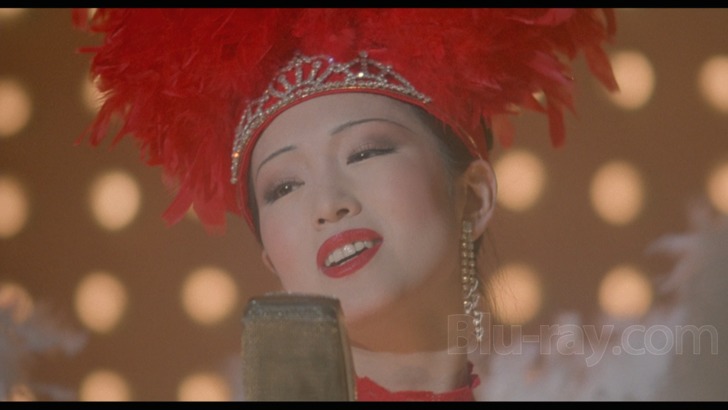Shanghai Triad Blu-ray Movie
HomeShanghai Triad Blu-ray Movie 
摇啊摇,摇到外婆桥Film Movement | 1995 | 108 min | Rated R | Aug 04, 2020

Movie rating
7.1 | / 10 |
Blu-ray rating
| Users | 0.0 | |
| Reviewer | 4.0 | |
| Overall | 4.0 |
Overview
Shanghai Triad (1995)
Shanghai, 1930. Mr. Tang, the godfather chief of the Tang family-run underground Green dynasty, controls the city's lucrative opium and prostitution trade. He has also acquired the services of Xiao Jinbao, the most beautiful prostitute-singer in Shanghai. Fourteen-year-old Tang Shuisheng has been recruited by his uncle to watch Xiao Jinbao. Ultimately, Shuisheng becomes the only person to whom she can talk openly and whose relationship with her is not motivated by power or greed. In secret, Xiao Jinbao has become the mistress of Song, the Greens' number two man, and together they conspire against Mr. Tang.
Starring: Gong Li, Baotian Li, Shu Chen (I), Xuejian Li, Biao FuDirector: Yimou Zhang
| Foreign | 100% |
| Drama | 60% |
| Crime | Insignificant |
Specifications
Video
Video codec: MPEG-4 AVC
Video resolution: 1080p
Aspect ratio: 1.85:1
Original aspect ratio: 1.85:1
Audio
Mandarin: LPCM 2.0
Subtitles
English
Discs
Blu-ray Disc
Single disc (1 BD)
Playback
Region A (B untested)
Review
Rating summary
| Movie | 4.0 | |
| Video | 4.0 | |
| Audio | 4.0 | |
| Extras | 1.0 | |
| Overall | 4.0 |
Shanghai Triad Blu-ray Movie Review
Reviewed by Jeffrey Kauffman August 2, 2020In a video essay included on this Blu-ray disc as a supplement, author Grady Hendrix talks about various ways to “read” Shanghai Triad, with Hendrix perhaps unexpectedly coming to the conclusion that the best way to interpret the film is as a deconstruction of the relationship between director Zhang Yimou and his star and (at that point, but for not much longer) lover Gong Li. It’s certainly an interesting approach toward analysis, but it perhaps ignores the fact that Shanghai Triad was actually culled from a novel that appeared in 1994 called Rules of a Clan, which would in turn necessitate having to believe that the author’s novel Li Xiao was a “prophet” of some sort, able to divine that the book would be adapted as a film and indeed would be adapted as a film specifically by Zhang Yimou with Gong Li as his star, thereby allowing the subtext that Hendrix perceives to be realized. Whatever way Shanghai Triad ends up being interpreted by individual viewers, it is, as even Hendrix himself gets into in some of his proposed ways to look at the film (which he ultimately rejects), a kind of throwback to “gangster flicks” from days of yore. It certainly has its own unique flavor, with a handsome production design that evokes the atmosphere of a teeming 1930s Shanghai which is more than rife with criminal activity. Despite its “exotic” setting, Shanghai Triad will probably come across as generally familiar to anyone who has gloried in the celebrated gangster movies that populated American movie houses courtesy of studios like Warner Brothers in the 1930s. There’s the nefarious crime lord, his moll who works as a chanteuse in a nightclub, power struggles both with other gangs and some internecine conflict as well, and a kid who enters the fray and serves as the audience’s stand in as observer of all the mayhem.

One of the things that Hendrix covers in his interesting piece is a certain voyeuristic aspect to Shanghai Triad, where characters are frequently seen watching other characters, or where even the framings Zhang utilizes kind of subliminally suggest that the audience itself is spying on various activities, with shots done through doors or windows and the like. And in fact the very first shot of this film is one of rather wide eyes, in this case belonging to a teenage boy named Tang Shuisheng (Wang Xiaoxiao). Shuisheng is a newcomer to Shanghai, and he seems positively gobsmacked to be surrounded by so much calamitous activity. He also quickly becomes aware of just how calamitous and downright dangerous the metropolis is when he witnesses a gangland drug deal go wrong, leading to an execution.
It turns out that Shuisheng's Uncle Liu (Li Xuejian) is a henchman of sorts for a Triad boss named Tang (Li Baotian). Tang is involved with a nightclub singer named Xiao Jinbao (Gong Li), whom Shuisheng is "assigned" to, ostensibly to help her, but perhaps with the assumed subtext that he will be another set of eyes to keep an eye on her and report back to the powers that be. Several interlinked stories of backstabbing (in one case more or less literal) play out, including the revelation that Jinbao has not been faithful to Tang, and also that a rival gang led by Fat Yu (Jiang Liu) is on the hunt for more power. Suffice it to say not all of the above named characters emerge alive from the maelstrom.
Kind of interestingly, after a skirmish of sorts which supposedly leaves Tang badly injured, his gang retreats to an island in the country, where the second half of the film plays out, and where Jinbao discovers a "kinder, gentler" way of living that ostensible forces her to have a reckoning with her own conscience. She ends up befriending a local woman named Cuihua (Jiang Baoying), who is a recruited cook for Tang, a friendship that ends up creating some unexpected consequences.
Hendrix gets into some of the "layers" of Zhang's approach to this film, with Hendrix making the point that Zhang, having had to wend his way through the often thorny politics of Communist China, had learned to fashion a "surface" message for the Chinese censors, and other, supposedly more covert, messages for those who were on the lookout for them. The surface aspect here is a rather biting critique of what Zhang evidently himself saw as a greed riddled Chinese culture that was being revolutionized in the 1990s by its sudden moves toward a more quasi-Capitalist market economy. But Shanghai Triad may not actually even need any deep analysis to succeed on even a surface level, since it works perfectly well as a basic "gangster flick", albeit one with a certain Boolean loop element that may suggest that all of these characters are caught in a kind of purgatory where they're forced to experience the same traumas over and over again.
Shanghai Triad Blu-ray Movie, Video Quality 

Shanghai Triad is presented on Blu-ray courtesy of Film Movement Classics, an imprint of Film Movement, with an AVC encoded 1080p transfer in 1.85:1. Kind of interestingly, while this is another Film Movement release without much technical information imparted on either the cover or insert booklet, the booklet states only a "digitally restored" descriptor, instead of the "new digital restoration" which is frequently found in Film Movement's booklet. That may indicate that this was culled from the same master as Svet covered in his Shanghai Triad Blu-ray review from Hong Kong's Panorama label that is now almost ten years old. That said, judging only by screenshot comparisons, which is obviously never foolproof, it does appear that this has noticeably different color timing, with what struck me as a cooler overall appearance in the Film Movement version. That said, the palette never looked "off" to me in any major way, and pops like the vivid reds that Gong Li frequently wears in her nightclub scenes look natural and extremely well suffused. This is another Film Movement offering which may strike some as being a bit too bright, which may in fact play into the perception of a somewhat cooler overall look. Grain generally resolves well, though there are some rough patches, as can be seen in some of the later screenshots accompanying this review. Detail levels are generally very good, elevated by Zhang's frequent use of close-ups. As Svet noted in his review of the Hong Kong version, there are some signs of age related wear and tear, with a few nicks and blemishes along the way.
Shanghai Triad Blu-ray Movie, Audio Quality 

Shanghai Triad features a fine sounding LPCM 2.0 track in the original Mandarin. Dialogue, effects and both score and use of music within the story itself, as in the many scenes featuring nightclub performances, all sound fine throughout this presentation. Ambient environmental sounds in some of the more rural scenes once the story shifts to the island also sound realistic.
Shanghai Triad Blu-ray Movie, Special Features and Extras 

- Trouble in Shanghai (1080p; 20:16) offers Grady Hendrix's triptych of interpretations, which play to relevant scenes from the film.
- Shanghai Triad Trailer (1080p; 1:31)
Shanghai Triad Blu-ray Movie, Overall Score and Recommendation 

While Grady Hendrix's thoughts about this being a coded "version" of the relationship between Gong Li and Zhang Yimou may strike some as at least interesting if perhaps not completely convincing, on a more general level, I think Shanghai Triad can be appreciated as being a film about people who are observing events and other people and finding things there that they didn't expect and which can be disturbing at times. That more general assessment certainly supports Hendrix's thesis about the relationship between Gong Li and Zhang Yimou, but it can also broaden out into some other perceptions, including "meta" aspects like Zhang seeing a downside to the Capitalism "invading" China, but also on a purely inherent plot level as Shuisheng in particular, but other characters as well, view the machinations of gangland life with some alarm. I wish Film Movement would start giving videophiles a bit more information on the provenance of their transfers, and those with a special interest in this film should probably carefully compare the appearance of this release with the Hong Kong release that Svet reviewed now quite some time ago. While the color timing looks different to me, generally speaking technical merits are solid, and Hendrix's appreciation is a fun listen. Recommended.
Similar titles
Similar titles you might also like

Raise the Red Lantern
Da hong deng long gao gao gua
1991

Coming Home
归来 / Gui Lai
2014

Dragnet Girl
非常線の女
1933

The Wild Goose Lake
南方车站的聚会 / Nán fāng chē zhàn de jù huì
2019

A Touch of Sin
天注定 / Tian zhu ding
2013

Ash Is Purest White
江湖儿女
2018

Outrage
アウトレイジ / Way of the Yakuza
2010

The Last Tycoon
大上海 / Da Shang Hai
2012

Shinjuku Triad Society
1995

Drug War
毒戰
2012

Casque d'Or
Golden Marie
1952

A Bittersweet Life
2005

Beyond Outrage
アウトレイジ ビヨンド / Outrage Beyond
2012

Triad Election
Hak se wui yi wo wai kwai
2006

Pigs and Battleships
豚と軍艦 / Buta to gunkan
1961

Election
Hak se wui
2005

Gomorrah
Gomorra
2008

Suburra
2015

A Prophet
Un prophète
2009

Bullhead
Rundskop
2011